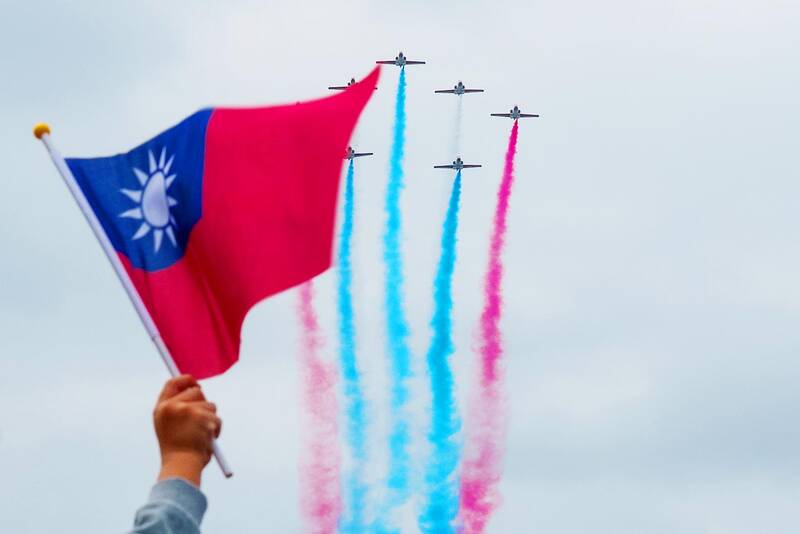Taiwan remained ninth in the world in terms of digital competitiveness according to this year’s report by Swiss-based International Institute for Management Development (IMD) released yesterday.
In this year’s IMD World Digital Competitiveness Ranking (WDCR), which assesses three major factors — knowledge, technology and future readiness — Taiwan ranked ninth out of the 67 regions assessed, unchanged from a year earlier.
Singapore was first in this year’s rankings, while Switzerland was second and Denmark third.

Photo: AFP
The IMD said Taiwan rose one place to sixth in “future readiness” this year.
Meanwhile, it fell one place and ranked 19th in “knowledge” and was down four places to seventh in “technology.”
The knowledge factor refers to having the know-how necessary to discover, understand and build new technologies; the technology factor indicates the overall context that enables the development of digital technologies; and the future readiness factor assesses the level of a country’s preparedness to make the most of the digital transformation, the IMD said.
“Overall, Taiwan’s performance is underpinned by large variations between strong performances in some areas of digital competitiveness, while also performing relatively poorly in others,” the IMD said in the report.
“Striking a balance between these variables could be key to the country’s future advancement in the WDCR,” it said.
The report showed Taiwan ranked in the top three in seven of the 59 sub-factors.
It ranked first in the information technology (IT) and media stock market capitalization sub-factor under the technology category, second in the total research and development (R&D) personnel per capita under the knowledge category, and second in agility of companies under the future readiness category.
Taiwan secured third place in the educational Program for International Student Assessment in mathematics, higher education achievement and the ratio of total expenditure on R&D to GDP — part of the knowledge factor.
Furthermore, Taiwan was third in the ratio of high-tech outbound sales to total exports, which falls under the technology factor, the report showed.
The Ministry of Digital Affairs said in a statement that this year’s digital competitiveness report showed the country has gained the upper hand in IT development, technology R&D, performance by enterprises and higher education.
The ministry said Taiwan improved in several knowledge sub-factors this year, including women in degree programs, scientific and technical employment and graduates in sciences.
Taiwan also moved higher in some technology rankings, including scientific research legislation, funding for technological development, venture capital, investment in telecommunications and wireless broadband, the ministry said.
Taiwan also improved in knowledge transfer, cybersecurity and government cybersecurity capacity, which it said was evidence of efforts by the public and private sectors.
The government would continue to invest in artificial intelligence (AI) development to help the country build an AI ecosystem, the ministry added.

Semiconductor business between Taiwan and the US is a “win-win” model for both sides given the high level of complementarity, the government said yesterday responding to tariff threats from US President Donald Trump. Home to the world’s largest contract chipmaker, Taiwan Semiconductor Manufacturing Co (TSMC, 台積電), Taiwan is a key link in the global technology supply chain for companies such as Apple Inc and Nvidia Corp. Trump said on Monday he plans to impose tariffs on imported chips, pharmaceuticals and steel in an effort to get the producers to make them in the US. “Taiwan and the US semiconductor and other technology industries

SMALL AND EFFICIENT: The Chinese AI app’s initial success has spurred worries in the US that its tech giants’ massive AI spending needs re-evaluation, a market strategist said Chinese artificial intelligence (AI) start-up DeepSeek’s (深度求索) eponymous AI assistant rocketed to the top of Apple Inc’s iPhone download charts, stirring doubts in Silicon Valley about the strength of the US’ technological dominance. The app’s underlying AI model is widely seen as competitive with OpenAI and Meta Platforms Inc’s latest. Its claim that it cost much less to train and develop triggered share moves across Asia’s supply chain. Chinese tech firms linked to DeepSeek, such as Iflytek Co (科大訊飛), surged yesterday, while chipmaking tool makers like Advantest Corp slumped on the potential threat to demand for Nvidia Corp’s AI accelerators. US stock

The US Federal Reserve is expected to announce a pause in rate cuts on Wednesday, as policymakers look to continue tackling inflation under close and vocal scrutiny from US President Donald Trump. The Fed cut its key lending rate by a full percentage point in the final four months of last year and indicated it would move more cautiously going forward amid an uptick in inflation away from its long-term target of 2 percent. “I think they will do nothing, and I think they should do nothing,” Federal Reserve Bank of St Louis former president Jim Bullard said. “I think the

SUBSIDIES: The nominee for commerce secretary indicated the Trump administration wants to put its stamp on the plan, but not unravel it entirely US President Donald Trump’s pick to lead the agency in charge of a US$52 billion semiconductor subsidy program declined to give it unqualified support, raising questions about the disbursement of funds to companies like Intel Corp and Taiwan Semiconductor Manufacturing Co (台積電). “I can’t say that I can honor something I haven’t read,” Howard Lutnick, Trump’s nominee for commerce secretary, said of the binding CHIPS and Science Act awards in a confirmation hearing on Wednesday. “To the extent monies have been disbursed, I would commit to rigorously enforcing documents that have been signed by those companies to make sure we get